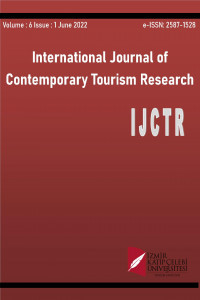Reflections of Industry 4.0 To Management of Service Enterprises: Smart Hotels
Reflections of Industry 4.0 To Management of Service Enterprises: Smart Hotels
Industry 4.0, Service Enterprises Management Smart Hotels,
___
- Ahmadov, Y., & Helo, P. (2016). “A Cloud Based Job Sequencing with Sequence-Dependent Setup for Sheet Metal Manufacturing”. Annals of Operations Research, 1–20. https://doi.org/10.1007/s10479-016-2304-3
- Bowen, J., & Whalen, E. (2017). “Trends That are Changing Travel and Tourism”. Worldwide Hospitality and Tourism Themes, 9(6), 592-602
- Breidbach, C. F. & Maglio, P. P. (2015). “A Service Science Perspective on The Role of ICT in Service Innovation”. European Conference on Information Systems (ECIS), Muenster, Germany.
- Friedman, J. P. (2007). “Dictionary of Business and Economic Terms”. Barron's Educational Series.
- Götz, M., & Jankowska, B. (2017). “Clusters and Industry 4.0–do They Fit Together?.” European Planning Studies, 25(9), 1633-1653.
- Oral, S., & Yüksel, H. (2007). “Hizmet İşlemleri Yönetimi”. İzmir.
- Hermann, M., Pentek, T., & Otto, B. (2016). “Design Principles For Industrie 4.0 Scenarios”. In 2016 49th Hawaii International Conference on System Sciences (HICSS) (pp. 3928–3937). IEEE.
- Holmström, J., Holweg, M., Khajavi, S. H., & Partanen, J. (2016). “The Direct Digital Manufacturing (R) Evolution: Definition of A Research Agenda”. Operations Management Research, 9(1–2), 1–10.
- Maglio, P. P., Vargo, S. L., Caswell, N. & Spohrer, J. (2009). “The Service System is The Basic Abstraction of Service Science”. Information Systems and E-business Management, 7, 395-406.
- Maglio, P. P., Kwan, S. J. & Spohrer, J. (2015). “Toward A Research Agenda for Human-Centered Service System Innovation.” (Commentary) Service Science, 7(1), 1-10.
- Neuhofer B., Buhalis D. & Ladkin A., (2013), “A Typology of Technology-Enhanced Tourism Expe-riences”, International Journal of Tourism Research, Int. J. Tourism Res., Published online in Wiley Online Library (wileyonlinelibrary.com) DOI: 10.1002/jtr.1958, 2013.
- Price Waterhouse Coopers International Limited Company. (2016). “2016 Global Industry 4.0 Sur-vey: Industry 4.0: Building The Digital Enterprise”.
- Schwab, K. (2016). “Impact on People, Business, Governments”. World Economic Forum Annual Meeting 2016”.
- Spohrer, J. & Maglio, P. P. (2008). “The Emergence of Service Science: Toward Systematic Service Innovations to Accelerate Co-Creation of Value” Production and Operations Management, 17(3), 1-9.
- Tübitak (2016). “Yeni Sanayi Devrimi, Akıllı Üretim Sistemleri, Teknoloji Yol Haritası,” Ankara: TÜBİTAK.Vargo, S. L. & Lusch, R. F. (2004). “Evolving to A New Dominant Logic For Marketing.” Journal of Marketing, 68,1-17.
- Başlangıç: 2016
- Yayıncı: İzmir Katip Çelebi Üniversitesi
Otel İşletmelerinde Kurumsal Sosyal Sorumluluk Uygulamaları: Kuşadası Örneği
Yeşim GÜL ÖZDOĞAN, Osman Eralp ÇOLAKOĞLU
Developing Tourism in Foça: Views of Undergraduate Students
Turist Rehberliği Bölümleri Ders Programlarının “Türk Kimliği” Açısından İncelenmesi
Tolga Fahri ÇAKMAK, Füsun İSTANBULLU DİNÇER
Corporate Image, Brand and Reputation Concepts and Their Importance for Tourism Establishments
A Criticism Of Contemporary Mass Tourism By Historical Analogic Approach
Reflections of Industry 4.0 To Management of Service Enterprises: Smart Hotels
A Strategic Performance Management Framework: A Hypothetical Hotel Case
Şırnak İlinin Gastronomi Turizmi Potansiyeli
Turizm Sektöründeki Çevresel Sürdürülebilirlik Yatırımlarının Finansmanı, Muğla İli Örneği
